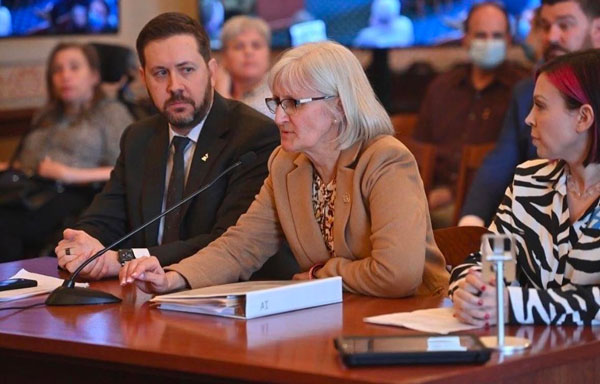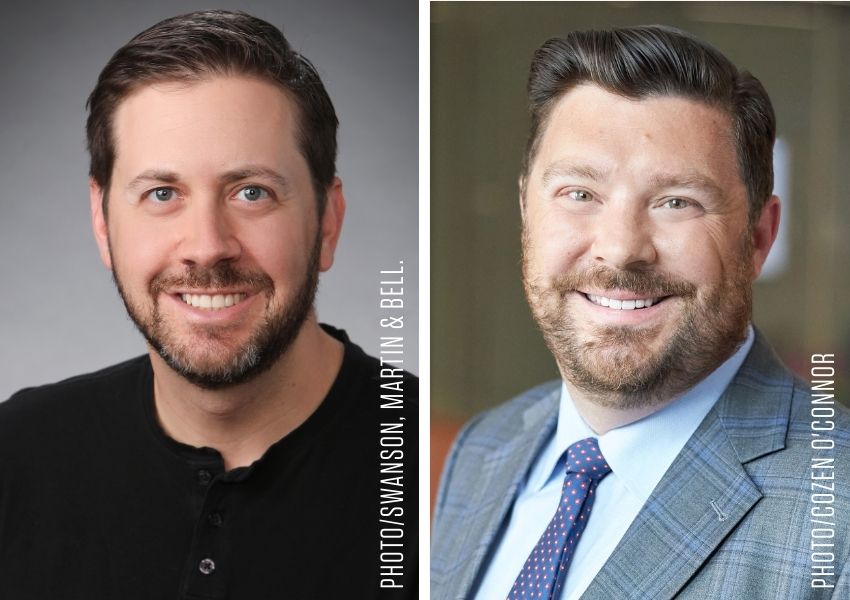Setting a Standard

By Chris Francis '13
Jeff Becker ‘01 and Matt Glavin ‘01 are the minds behind Illinois' new AI regulation that's setting a standard for states across the country.
· · ·
The world felt like it had entered a new era of technology after the public release of ChatGPT, the large-language-model artificial intelligence (AI), in November 2022. Spurred by the uncannily human-like chatbot as capable of writing poetry as boilerplate legal contracts, entire industries immediately began imagining how this technology could be used—an important concern for Jeff Becker ‘01, a member of the board of governors for the Recording Academy, and Matt Glavin ‘01, managing director of Cozen O'Connor Public Strategies in Chicago.
But ChatGPT was only the starting gun in an information technology arms race that dozens of companies had already spent years preparing for. Billions of dollars of international investment are accelerating AI’s development into a technology that may one day remake the economy as we know it. And where many industries have seen in ChatGPT the potential for automating communication, customer service and data analysis — potentially displacing countless workers before regulation has a chance to consider the effects — others are seeing the present threats to artistic creators posed by ChatGPT’s cousins.
“A.I.-based image generators like DALL-E 2, Midjourney and Stable Diffusion have made it possible for anyone to create unique, hyper-realistic images just by typing a few words into a text box,” wrote New York Times technology columnist Kevin Roose just a month before ChatGTP’s public release.
The threat these technologies pose to the jobs of sales reps, graphic artists and photographers has been limited, so far. Generative AI, a term referring to AI that creates varieties of content from a prompt provided by a human user, appeared as a technological wonder but has since revealed its shortcomings.
Chatbots will “hallucinate” falsehoods and devolve into madness as a conversation stretches on, and image generators will miscount the number of fingers or teeth a person should have, speaking of uncanny.
As of today, this technology has mostly fallen short of what the companies who might employ it would need them to do to truly automate or improve productivity, though its brief history has shown how quickly that might change.
But, for now, it’s more than good enough for a scammer.
· · ·
Even though “there are differences between text-generating (generative AI) models and many common media-generating models just below the surface,” IWU Professor of Computer Science Mark Liffiton explained, “at the highest level, they're all trained on large amounts of existing data with a goal of generating new outputs that look just like the data used in training.”

That data includes billions of words, images, sounds and videos that have been collected on the internet for decades. YouTube alone serves as perhaps the most valuable source of AI training data in the world, available for Google’s internal development of generative AI, but many sources of data are currently contested by lawsuits that claim their unauthorized use amounts to intellectual property theft.
Meanwhile, the generative AI products themselves may enable other forms of creative fraud.
“Once we started seeing how musical artists were being ripped off, a lot of conversation began in the music industry about, ‘What in the world could we actually do to stop this? What laws exist?” said Jeff, partner at, and founder/chair of the Entertainment and Media Law Practice Group at Swanson, Martin & Bell, LLP.
Music-generating AI presented an entirely new challenge for the industry. Copyright law had long protected a musician’s right to reproduce and sell their music without being undercut by counterfeit copies, but it wasn’t prepared for truly original songs that fraudulently claimed to be the newest tracks from the world’s most popular musicians.
“There’s a famous case involving Bette Midler where a car manufacturer wanted her to sing a song for their commercial, but she didn’t want to do it,” Jeff recalled. “So the company found someone who could sing just like her and had the impersonator do the commercial instead.”
With new generative AI technology, products like AVIA and Udio can do something similar with simple inputs, creating tracks that sound comparable to studio-produced songs by artists like Taylor Swift or Beyonce, requiring as little as the text of the new song’s lyrics (which might in turn be written by ChatGPT) and a musical sample from the artist being impersonated. Then the song can be made available for sale online, claiming to be a surprise release from an international superstar.
Before these generative AI products, attempting something like that would take a full-blown studio product that would be exposed as fake long before it could recoup its costs. But now, even if the imitation is sub-par, it only needs to fool a handful of buyers to be worth the effort, which could be easily repeated a dozen times over a weekend.
“In Midler’s case, she was able to take the company to court because her ‘likeness’ was being used to promote a product. But it was immediately clear that the existing law wasn’t adequate for AI,” Jeff said. Indeed, “if the same song was being created using AI and uploaded to Spotify or Apple Music, there would be no such violation of Illinois law.”
Already on the books in the state of Illinois were “right of publicity” laws, which protect people from having their name, image and likeness used for promotional and commercial purposes, but the laws don’t similarly prohibit the use of someone’s likeness for artistic purposes. AI-generated music falsely claiming to be created by an artist fell in an uncomfortable gray area.
“I started having talks with folks at the Recording Academy about, ‘What can we do here?’” Jeff said. “Eventually I got in touch with state representative Jen Gong-Gershowitz,” of Illinois’ 17th district in the state General Assembly, which covers suburban Glenview and Wilmette.
Gong-Gershowitz emerged as an obvious legislative partner after sponsoring HB4623, a bill protecting children and adults from having their likeness used in AI-generated pornography. Similar principles could apply to the right to have one’s artistic expression and business protected from generative AI.
“Jeff and Matt have been indispensable partners in making sure Illinois' artists are protected from the abuse of generative AI — an issue my office is working on every day,” said Representative Gong-Gershowitz. “Smart legislation on complex, cutting-edge issues like AI requires thinking ahead and seeing several steps in advance to ensure this technology best serves everyone. Jeff’s technical knowledge and expertise combined with Matt’s deep understanding of the legislative process have played a critical role in establishing Illinois as a leader in sensible AI regulations.”
· · ·
A second obvious partner was Matt, a floor-mate of Jeff’s during their first year in Dolan Hall. They both started their careers in policy as Student Senate representatives with Matt rising to become president in his junior and senior year.
“Matt had a lot of brothers in the TKE house that I was friends with, so I would see him there too a lot,” Jeff recalled.
Both Jeff and Matt credit their liberal arts education at IWU for turning them into creators of Illinois policy.
“Wesleyan is entirely responsible for where I am,” Matt said. It was an internship with Senator Dick Durbin during his time at IWU that started Matt’s career. “The senator offered me a job in Chicago after graduation. And now I’ve hired two IWU alumni for my team,” Gabby Manzanares ‘21 and Sofia Papoutsis ‘22.

Jeff began at IWU as a pre-med psychology student until he took a class on business law.
“I came to love the idea of being a lawyer,” Jeff said, especially relishing the challenge he saw in a general attitude that “law students don’t get jobs—good, smart, hard-working law students get jobs.” Since joining Swanson, Martin & Bell LLP, Jeff has had a fellow alumnus mentor in Joe Kincaid ‘84.
After graduating and continuing to work in policy and law, the two regularly crossed paths between Chicago and Springfield, so, when it came time to enlist the help of someone who could navigate state policy negotiations, Matt was the first person to come to mind.
“I told (representatives from the Recording Academy), ‘You know, I went to college with a guy who’s really respected down in Springfield, it might be a good idea to call him,’” Jeff said. “So Matt and I got together with Representative Gong-Gershowitz and members of the Recording Academy—and we coalesced a plan for the law we have today.”
From beginning to end, the whole process was remarkably quick in terms of state legislation, which was a clear necessity in a world where AI technology seems to advance every few months.
“The great thing was that no one was opposed to this law,” Matt said. “There’s no ‘Association of People Who Steal Artist’s Voices,’ but there were a lot of people with legitimate questions. We talked to the Motion Picture Association, Apple, Google, Amazon about where the liability should fall.” The companies that create the most advanced AI models capable of music creation seemed to steer clear of the discussions. “We didn’t talk to them,” Matt said.
· · ·
In the end, the answer was an amendment to the Illinois Right to Publicity Act that carved back and limited some of the exemptions that had existed in prior editions of the statute.
The new law now makes it illegal to utilize AI and other forms of technology to digitally replicate a person's voice or image without permission and to use it in any publicly available sound recording or audio-visual, even if those works did not previously qualify as "commercial purpose" under the law.
For example, no longer could someone use AI to make a song sound like Chance the Rapper without subjecting themselves to potential litigation. Jeff and Matt also made sure there were various protections in place for service providers who host the possibly violative content by utilizing concepts of Fair Use and Safe Harbor protections found in the Digital Millennium Copyright Act (DMCA).
With their bill, HB4975, Illinois has become only the second state in the nation to grant these protections to musical artists, only one year after Tennessee (home of the Nashville music scene) passed the first law to address this issue.
Jeff and Matt agree that this new Illinois law is going to be a model for other states.